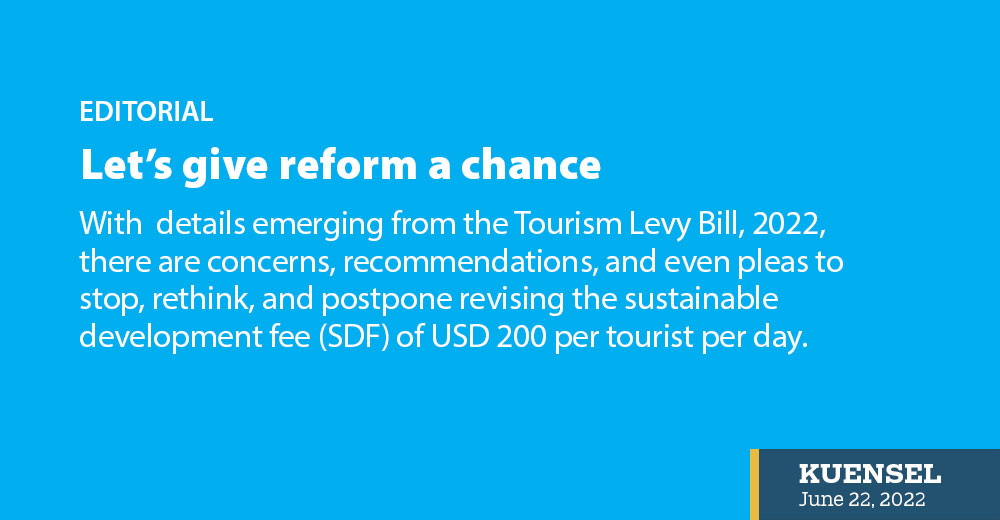With details emerging from the Tourism Levy Bill, 2022, there are concerns, recommendations, and even pleas to stop, rethink, and postpone revising the sustainable development fee (SDF) of USD 200 per tourist per day.
This was expected. Tourism and allied sector is a huge sector. The concern expressed is unanimous – that the proposed change would defeat its purpose because guides would become jobless, hotels would be locked, and tourism revenue would decline, derailing the economy.
The concerns are convincing. But there is a purpose for the reform. With the Covid-19 pandemic almost over, the talk is about recovery and returning to normal. For the far-sighted and the visionary, it is not about returning to normal. It is about reforming or reinventing the future. It is about not losing the opportunities from the long-drawn impact of the pandemic.
At the heart of this discourse, what can be useful is knowing that any policy change or reform, no matter how wonderful it is, will be resisted. There will be a welcoming group and an unhappy one. We saw this recently after the implementation of the civil service reforms.
The government is taking a bold decision, well aware of the political consequences. They have the political will to reform the sector for the benefit of “all Bhutanese” and not the regular stakeholders – travel companies, hotel industry, guides and drivers. Some are already rolling up their sleeves to “see” the government in 2023.
After decades, there is a government that is risking public anger to bring in the much-needed reform in tourism. We had been talking about not having a tourism policy for years. There are rags-to-riches stories in the tourism sector, but it is only a handful. Numbers alone are not an indication of success. Only a dozen tour operators handle more than 50 percent of the total tourist arrivals.
If the benefit of tourism can trickle down to every Bhutanese in whatever ways, we should give it a chance. If the reform is going to make Bhutan a truly “high-end” destination, we should support it; if the returns from the revised rates are going to be reinvested in infrastructure, we should welcome it. Infrastructure like improved roads, internet connectivity, and public amenities will benefit all Bhutanese.
If the high value is not being achieved, we should question the decision makers and look for better alternatives. Bhutan is still sold as a high-end destination. If a group of tourists arrive tomorrow, we will be embarrassed. We have not done anything during the time the pandemic has provided us. The complaint will start with our roads that are riddled with potholes. Itinerary would be forced to change as all major highways are blocked at several places. The joke – we do it in nature (nature call) will not always remain funny.
The government should convince people how Bhutan would be a high-end destination or how we will achieve high value. Every guide, waiter or waitress, a farmer or a made in Bhutan “baby yak” scarf seller at Dochula should be convinced as to how the policy would benefit them. For all this to fall into place, there is the need for time.
Nipping the policy in the bud is not a good alternative. From the comments and concerns, not many are against the policy. Most want to defer the SDF revision because many had not cancelled their pre-Covid bookings. A one-time consideration sounds reasonable.
If the reform can make tourism an industry that promotes growth, it is high time we gave it the wind.


